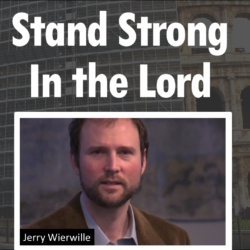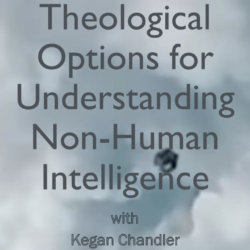Today we are starting something new. I’m very excited to present to you in its entirety, the apologetics conference held in Paduc ah, KY last June. We’ve got a great line up of speakers for you including Jerry Wierwille, myself, Kenny Willenburg, Dale Tuggy, Kegan Chandler, and John Truitt.
ah, KY last June. We’ve got a great line up of speakers for you including Jerry Wierwille, myself, Kenny Willenburg, Dale Tuggy, Kegan Chandler, and John Truitt.
It was a wonderful time of meeting people and working together to figure out ways of reaching the millennial generation with the gospel. As it turned out, a great majority of the presentations focused on understanding the post-modern worldview. This was so helpful, because it’s nearly impossible to discuss important issues if both people are unaware of the fact that they are each coming from incompatible worldviews. Although, for many of us, our natural inclination is to show someone why their underlying assumptions are invalid, a better starting point for evangelism is to work within their post-modern outlook to show how attractive and awesome the gospel is.
In this first presentation, Jerry Wierwille covers a brief history of how major philosophers initiated a movement that led to sequestering away of faith as something personal and private. Then he shares how to broach spiritual topics with secular people around us. His talk is relatively short, only 34 minutes long, but I also included the questions and comments, which went for another half hour.
—— Notes ——
Rene Descartes (1596-1650)
- early 1600s
- cogito ergo sum
- put himself at the center of reality rather than God
- previously, scientists located God at the center of the universe and from there derived his laws
- divided mind from matter
John Locke (1632-1704)
- empiricism
- sense perception is the basis for true knowledge/reality
David Hume (1711-1776)
- skepticism
- anything not proven using scientific method is not verifiable
Immanuel Kant (1724-1804)
- appearances of forms
- absolute idealism
- law of non-contradiction
- freedom above nature
Georg Hegel (1770-1831)
- dialectic idealism
- thesis, antithesis, synthesis
value/fact divide
- religion relegated to the mind, but not objective
humanism
- manifestos in 1933, 1973, 2003
- progressive philosophy of life that w/o supernaturalism affirms our responsibility to lead ethical lives
- live well, fully
- values and ideals however carefully wrought are subject to change
- knowledge derived by empirically
- humans are part of nature, the result of unguided evolution
- ethics derived from trial and error, treat others as having inherent worth and dignity
- life’s fulfillment found in wonders and joy of human existence
- humans find meaning in relationships; want a world free of cruelty; differences resolved cooperatively w/o violence
- working to better society maximizes happiness; support a just distribution of nature’s resources so as many as possible can enjoy a good life; human rights; civil liberties; civic duties to vote
- the responsibility for our lives is ours and ours alone
private life (values)
————————-
public life (facts)
you can have beliefs, but they are private
- privatization is one of the main problems in our society for evangelism
- culture/public life must be devoid of religion
- you can believe what you want, but don’t tell me what to believe
- we all make our own truth
- called judgmental, traditionalist, intolerant
87% think Christians are judgmental (pessimistic towards Christianity)
only 9% of younger generation trust what Christians say
contextualizing the presentation
- how do you win credibility w/ someone
- just claiming propositional truth is ineffective
have to understand the thing they prize most
- speak into that the way Jesus did
- engaging the heart
- if you want ppl to consider what you have to say, you have to meet them where they’re at and reach their heart
- this is not just finding similar interests
- rather, it’s asking questions to find out where they’re coming from and why they think they’re beliefs are true
- ask them to tell their story
- find out what they think their place is in the world
- speak to their need
to win the day is not to convert on the spot
- there’s a better way
- let them know you believe it and it works for you
- open a space that’s mutually inviting
- engage the heart
—— Links ——
- Listen to Jerry Wierwille’s previous interviews here
- Check out these sermons and articles on Wierwille’s website (JerryWierwille.com)
- More info about KingdomFest (Sep 7-9, 2018)
- For John Truitt’s Virtual Church email him at jtruitt@kalleo.net, visit him on YouTube, or listen to this interview
- To connect with other isolated biblical unitarians in your area, email Robin Todd at robinsings4u@comcast.net or visit the Scattered Brethren Network
- Intro music: Jazzy Frenchy by bensound.com. Licensed under Creative Commons: By Attribution 3.0 License.







Perhaps this may bless some believers: https://amzn.to/2vdALkh
Hi, an interesting attempt to give a broad stroke history of philosophical worldviews, but: neither the world nor the USA is dominated by postmodern thinking.
“Privatizing” as you call it did not start with humanism as you described it. It was the established churches beginning in Enlightenment, dealing with the advance of science!coupled with the need for toleration in multi-belief nations.
I am not a humanist. Period. BUT the humanism you set up as straw man is certainly not dominant in our culture. Most people just don’t subscribe to it. Try ‘capitalism’ as the instigation for me-but-not-you culture where explotation (ie, treating others as means to ends, subjects) is the golden rule. Try living in common as those early Christians did.
My previous comment should have read ‘humanism’ in first paragraph, not postmodernism. (Listening now to your podcast on postmodernism).